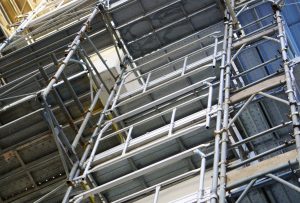Hello, this is Conspi's CPM HaSegawa.
We've had a system in place (for the past few months) where each section in our company takes turns writing blog posts here.
We can turn the "real voices" from each site into reading material,
I think the range of articles has become a little more varied.
So, in the midst of all this.
I thought that the following points were not mentioned in each section.
"Large-scale renovation of an entire profitable propertyI would like to take up this idea of ``" this time.

"Income-generating propertyOne of the advantages of this is that the management association has a BM company under it.
This company will take the lead in collecting "management fees and repair reserve funds" from each owner.
It reduces the hassle for owners to have to consider and arrange large-scale repairs themselves.
This is definitely easy.
Now, on the other hand,One-building profitable property(Condominiums and Apartments)
It goes without saying that in a building, one owner owns the building.
This means that the cost burden for the entire building is simply
This means that decision-making will be done by you alone.
Yes, that’s normal here.
In addition, the volume of large-scale repair work is also
It makes a huge difference whether it's wood and light steel, or steel and reinforced concrete.
If it is a small-volume wooden or light steel structure,
In the first place, the structure is not that big.
There is no "heavy equipment" on top of it.
As an exit option, there are options to demolish the building and sell the land, or rebuild.
On the other hand, in the case of S and RC construction,
It's not something that can be easily dismantled,
After all, a "planned" perspective is necessary.
The areas where costs will be high are as follows:
- Repair and painting of iron parts
・Ceiling repair work
・Waterproofing of roofs and rooftops
・Repair work on exterior walls
- Waterproofing renovations for balconies, etc.
・Elevator replacement work
・Renovation of aluminum parts
・Water supply and drainage pipe and water tank replacement work
As I often say in my seminars at The BASE,
Since real estate management is about making money by having people use the property,
The moment you cause inconvenience to your tenants,
You should think of this as increasing the possibility of loss.
However, if you are the owner, it is natural that you want to keep expenses down.
From here on, I think it depends on the management company's decision.
Personally, I think it's about how "planned" you can manage your funds.
"I don't know when it'll come."
"I don't know how much it's going to cost."
At the very least, just visualizing these two points to some extent will
I think this should ease the owner's concerns.
The key point at that time was,
also"Converting Capex to Opex" I think that's the way of thinking.
(For more details, see "Cash Flow Tree"Explanation blog,YouTube videos,
Or you can refer to Hasegawa's seminar...)
Capex means "capital expenditure."
Roughly speaking, it is an expense that comes suddenly and is large in amount.
On the other hand, "Opex" is "operating expenses",
These are the daily expenses incurred for maintenance.
Capex is a big blow and can cause damage to cash flow.
The question is how to convert this into "Opex"
This is the key point.
… I know it sounds difficult, but
In essence, it means "be prepared."
It's quite simple after all.

Classification as well asLong-term repair plans"of
We will operate it properly,
Link the plan with the financial plan at the same time.
That's all I can say.
In a sense, large-scale repairs can be outsourced.
Although the classification may certainly reduce mental stress,
On the other hand, because they cannot be "under self-control",
There are pros and cons.
The important thing is,
"I'm scared that someday there might be some big construction work coming..."
Do not be afraid or tremble.
Think rationally and logically,
The key is to make the enemy visible.
The view on this matter is,
This is possible through Conspi's counseling, so
We hope you will find it useful.
(Only the last part is an advertisement)
That's all for this time.
CPM was brought to you by Segawa.
↓For real estate consultation, click here↓
The person who wrote this blog
CPM Yusuke Hasegawa
CPM (Certified Professional Property Manager) certified professionals will provide easy-to-understand explanations on a variety of topics.
